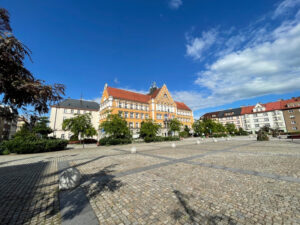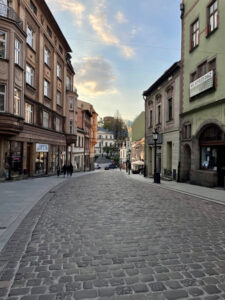
Zora Piskačová is a 5th-year Ph.D student in history at UNC Chapel Hill, where she studies interwar East-Central European history. In November of 2022, she received the Association of Slavic, Eurasian, and Eastern European Studies Beth Holmgren Graduate Student Essay Prize for her piece “A ‘Common Enterprise?’: The Role of Utility Infrastructures in the Divided City of Teschen, 1920-1938.” This year, she won the Anthony Jung Award for Best Graduate Student Paper for the European Studies Conference held at the University of Nebraska Omaha.
Zora’s research connects back to her own family’s history: “My mother’s parents came from a town called Orlová in Czech Silesia – a town some 15 miles north-west from Český Těšín. My grandfather Václav was born in 1921, my grandmother in 1934. They both lived in this region which bordered Poland most of their lives. My grandfather was a self-taught intellectual. He read everything imaginable, played chess and guitar, and knew something about everything. He loved the region he came from and even wrote a chronicle of the mine he administered in his old age.”
While working on her project, Zora rediscovered some of these ties: “When I went to the local archive that houses the municipal records of Český Těšín – Státní Okresní Archív in Karvina – it turned out the archivist remembered my grandfather, who came there to do research for his chronicle more than a decade prior. I knew he loved the region and never quite managed to let it go, despite his move to the capital. It was touching, somehow, to reconnect with this place that meant so much to him, but that I was never really part of.”
Zora studies the division of the multiethnic Habsburg city of Teschen into Polish Cieszyn and Czech Český Těšín in the period between the First and Second World Wars. Before 1918, Teschen was the capital of the Dutchy of Teschen in Upper Silesia. Following the First World War and the fall of the Austrian-Hungarian Empire, the new states of Poland and Czechoslovakia sought to control it: “Poland claimed it based on ethnic grounds; Czechoslovakia argued the local railway junction was necessary for its survival as it connected its Czech lands with Slovakia. The two states clashed over the region in a week-long war and the period which followed and was supposed to be ended by a plebiscite saw a rise of nationalist fervor and violence as both sides and the German loyalists tried to sway the local population in their favor. To avoid further escalations the Allied Powers decided to split the region in half and severed its capital in the process creating two towns out of one.”
This political solution did not account for the physical infrastructure necessary for the running of a modern city, Zora explains: “The towns shared not only a hospital but also a power plant, a gasworks and one water supply network all of which could not be easily duplicated.” The locals, however, were able to cooperate and solve these problems: “They ran a shared ambulance service for a time, cooperated to suppress petty crime, and encouraged a close cross-border relationship between the two municipal fire brigades to shield their urbanites from fire hazards. My dissertation is therefore about the men, and yes, they were 99% men, who tried to make their divided city go on without too much disruption. To achieve this, they also compromised within their individual municipal assemblies as the town did not consist of just Poles and Czechs, there were Germans, Jews, and a group that identified as Silesians. Local administrators that made such daily life possible were therefore more than vicious perpetrators of violence, mindless nationalists, or obedient servants of their national governments.” “Nationalism,” Zora argues “was not always the determining factor. They were pragmatic actors who defended their constituents sometimes against the wishes of their respective governments.”

Zora recognizes that her findings may seem surprising to many. “When people ask me what I’m writing about, and I want to make a joke I say: ‘Municipal administrators doing their jobs.’ It’s boring because it’s so mundane. They mostly talk about trash collection, argue about municipal budgets, and try to get everyone in the town enough running water, and yet I think that while large questions of nationalism were important this research shows that life goes on and men were able to compartmentalize their interest. These men were not indifferent to nationalism of course. They had to ‘pick’ a nationality because they had to run for election in a system that necessitated it. Some of them were even ardent nationalists. Holding speeches and rallying men and women against the ‘other’ side and yet they were still very much able to sit at the same table with men who did not share their views, men they often actively fought against during the hot period of the conflict in 1919-1920 and still come to a compromise. The basic interest of the constituents topped in most cases all kinds of ideology and while the period ended in bloodshed, this was by and large a top-down decision that people bought into but did not necessarily instigate.”
In developing this project, Zora has also come across stories that have surprised her: “Doing research on the interwar period, I knew oral history won’t be an option as most first-hand witnesses were long gone. I also never imagined I’d meet someone who would actively remember the time I was writing about. But I was wrong.” In 2022, after presenting her research at a German conference on Silesia, she received a typewritten letter from Dr. Herbert Patzelt: “Dr. Patzelt had read about my presentation and expressed interest in my work on Teschen as he had been born there in 1925 and as a German-speaker forcefully expelled in 1938 following the Munich Agreement. I sent him the little I had written, at the time and he sent me back a thick package featuring copies of pictures of his family, the town of Český Těšín, and even his school report. He also included a short memoir he has written about his childhood in the town that I was previously unaware of. Sadly, I did not have a chance to reply to this wonderful compilation which spoke of his love for the place he had to vacate as Dr. Patzelt passed away shortly after sending the letter to me. As historians, we don’t always get to have this kind of interaction.”
Zora’s work seeks to add nuance to our understanding of a region that has often been defined by competing nationalisms and inter-ethnic violence. “This is a unique case of course that owes a lot to practices of tolerance inherited from the imperial era as well as the fact that the town wasn’t ethnically segregated.” She continues: “In that sense, I would argue that what we see here is that behind all the literature on war hide other stories – stories that are perhaps less exciting and that do not make it to the newspapers but no less true. To understand how we got where we are, how conflict happens, and how to perhaps prevent it, we need to learn about these ‘mundane’ stories too.”

